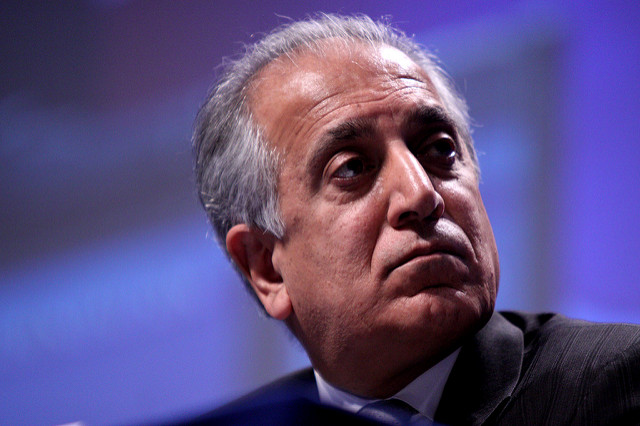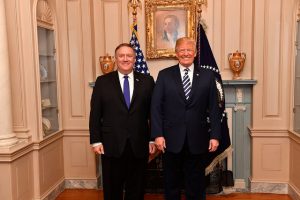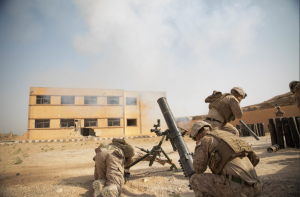by Paul R. Pillar
Much remains to be negotiated, but the partial agreement reached between the United States and the Afghan Taliban is a positive development. Commendation for this progress is in order for the Trump administration and for U.S. envoy Zalmay Khalilzad, who is uniquely qualified by background and experience to have undertaken this assignment.
Some of the chief objections voiced against this step toward extricating the United States from an interminable war are valid as far as they go, but they do not go far enough to evaluate fully where U.S. interests lie. The agreement will not necessarily end the war, at least not right away, but the war surely will not end in the absence of such agreement. And without such an agreement, the United States will continue to share in the costs.
Yes, this agreement is probably a step toward a Taliban role in the Afghan government and, with it, a Taliban role in shaping some governmental policies that Westerners would find distasteful. But one must always weigh the alternative. Although the status of Afghan women under Taliban-influenced policies, for example, has long been a legitimate concern, the daily lives of most Afghan women are no better and most likely worse in a war zone.
Then there is the issue of leverage from the presence of U.S. troops. But any such leverage has accomplished nothing in changing the Taliban’s posture during 17 years of war, even when there was no expectation of an impending U.S. troop withdrawal. The United States has the watches but the Taliban have the time, and that time has no limit. The Taliban can always outwait the Americans, no matter how long the Americans stay. The Taliban aren’t going anywhere; they’re already home.
Perceptions of the new diplomatic development are unfortunately colored in ways that detract from a clear-headed evaluation. One reason is that Donald Trump is involved. This means Democrats are primed to smell rats and to find points to criticize, while some Republicans—faced with an administration move toward less rather than more use of military force—are using Afghanistan as an opportunity to make a rare show of independence from Trump. As with the prospective withdrawal of troops from Syria, Trump’s position on Afghanistan has shown some of his familiar impulsiveness and disdain for orderly process, but that is a different issue from the value of what has emerged from the U.S.-Taliban talks in Doha.
Another reason is the sheer longevity of the U.S. war effort in Afghanistan. As has happened in other prolonged wars, sunk costs mistakenly come to be viewed as investments that must be paid off with something that can be described as victory. The longevity also has led some tactical U.S. objectives to be looked upon as if they were strategic goals assumed to be important to the United States.
In fact, the domestic political and social structure of Afghanistan is simply not very important to the United States, and certainly not important enough for the United States to fight an endless war over it. That truth is understandably hard to accept for many dedicated officials and specialists who, like Khalilzad, have spent much of their professional lives in the pursuit of Afghanistan-related objectives.
The United States first got interested in Afghanistan after the Soviet intervention in 1979, when Jimmy Carter’s national security advisor, Zbigniew Brzezinski, saw lethal aid to Afghan insurgents as an opportunity to stick it to the Soviet Union. The much bigger piece of history for Americans was the 9/11 terrorist attack, perpetrated by a group then enjoying hospitality from the Afghan Taliban. But that traumatic history should not be confused with terrorist threats today. The gloves came off long ago, and no U.S. administration would now hesitate, as pre-9/11 administrations did, to use air power to strike against anything that resembled the earlier al-Qaeda presence in Afghanistan. The Taliban are not international terrorists, and they have a strong incentive not to endure a repetition of what happened to them when the United States responded to 9/11. Their promise in the new partial agreement not to host more terrorist groups is meaningful.
There is nothing unique about Afghanistan as a possible haven for international terrorists. Such a haven is not necessary for a group to perpetrate death and destruction in the West, and to the extent a group desires a physical haven, there are ample alternatives to Afghanistan.
Further negotiations on the political future of Afghanistan will encounter many bumps and points of controversy, especially as the Afghan government of Ashraf Ghani gets more directly involved. American critics of the process should keep in mind the big picture and where in that picture U.S. interests do and do not lie.






The US was not able to search for a similar reconciliation with Taliban before invading Afghanistan? Only 17 years of continues, vast destruction could convince the Militarists to search for a dialogue?
As a combat veteran, I see the situation in much simpler terms. “Our” war in Afghanistan is unwinnable and that has been plain to see for many years. It is only the moral and political cowardice of our leaders that has kept that war going. A good military leader knows when to sound the retreat and does not shrink from doing so whenever it becomes plain that a war cannot be won.
Unfortunately, we are led by cowards who would rather sacrifice untold thousands of human lives than take responsibility for ending the war. This is just the Viet Nam War redux. Peace with Honor does not come from continuing a war that cannot be won.
360 degree Zorba dance and back where it started it! The US, Khalilzad, is negotiating with the Talibans while they have NOT reconciled their differences with the Afghanistan puppet government! The US has made its decision that enough is enough and it’s time to save face and exit Afghanistan! As soon as US pulls out of Afghanistan the Talibans will overrun the entire country and established their own desired form of the government regardless of their agreement with the US! Very typical, Reagan did the same thing and Talibans /Al-Qaeda did the exact same thing and ruled the entire country! The trio (Trump, Pimpeo & Boltovich) at the foreign helms we’re in deep Dudu!
Peace with honor? What kind of BS is that. Escaping from roof of US embassy in Saigon and over boarding helicopters from the deck of carriers is now called peace with honor? There is more honor to admit loss of an unnecessary war and apologizing for killing millions of innocent human beings in Vietnam and Afghanistan and elsewhere. When this country and it’s sheeples will want to learn the superpower, BS is just that BS .